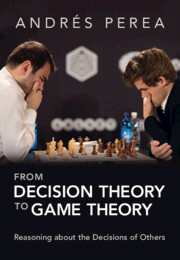
-
Select format
-
- Publisher:
- Cambridge University Press
- Publication date:
- June 2025
- June 2025
- ISBN:
- 9781009522847
- 9781009522809
- 9781009522830
- Dimensions:
- (244 x 170 mm)
- Weight & Pages:
- 1.192kg, 555 Pages
- Dimensions:
- (244 x 170 mm)
- Weight & Pages:
- 0.96kg, 555 Pages
You may already have access via personal or institutional login
Book description
From Decision Theory to Game Theory shows how the reasoning patterns of common belief in rationality, correct beliefs and symmetric beliefs can be defined in a unified way. It explores the link between decision theory and game theory, particularly how various important classes of games (e.g., games with incomplete information, games with unawareness and psychological games), can be analysed from both a unified decision-theoretic and unified interactive-reasoning perspective. Providing a smooth transition between one-person decision theory and game theory, it views each game as a collection of one-person decision problems – one for every player. Written in a non-technical style, this book includes practical problems and examples from everyday life to make the material more accessible. The book is targeted at a wide audience, including students and scholars from economics, mathematics, business, philosophy, logic, computer science, artificial intelligence, sociology and political science.
Reviews
‘The book is engaging, well-structured, and well-written by a leading scholar in the field. It presents the key concepts in an exceptionally clear and simple way, making them accessible to readers with a minimal background in mathematics. I recommend the book for researchers and students who want to learn the epistemic foundations of game theory.’
Xiao Luo - National University of Singapore
‘This is a thorough, comprehensive text, that treats decision making in a unified way for three classes of games: games with incomplete information, games with unawareness, and psychological games. The unified treatment makes it possible to bring out similarities and highlight differences. Perea brings the reader to the forefront of current research in an engaging way, with many illustrative examples.’
Joe Halpern - Cornell University
Contents
Metrics
Full text views
Full text views help Loading metrics...
Loading metrics...
* Views captured on Cambridge Core between #date#. This data will be updated every 24 hours.
Usage data cannot currently be displayed.
Accessibility standard: Unknown
Why this information is here
This section outlines the accessibility features of this content - including support for screen readers, full keyboard navigation and high-contrast display options. This may not be relevant for you.
Accessibility Information
Accessibility compliance for the PDF of this book is currently unknown and may be updated in the future.

